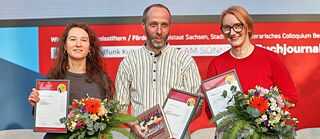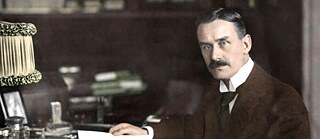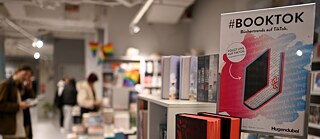Kristine Bilkau wins Leipzig Book Fair Prize A Mother’s Restlessness, Putin’s Language, German Atrocities

Kristine Bilkau receives the Leipzig Book Fair Prize for Halbinsel, the non-fiction prize goes to Irina Rastorgueva and Thomas Weiler wins the translation prize.
The jury for the Leipzig Book Fair Prize welcomes a new chairwoman: Katrin Schumacher. A literary editor with the public broadcaster MDR, she is a familiar face to attentive viewers of the programme Kulturzeit. As the host of the awards ceremony, she brought a refreshing lightness to the event. One of its more amusing mishaps was the near-overlooked laudatory speech for the prize winner – until literary critic Cornelia Geißler stepped in to ensure it was delivered after all.Prize for fiction
The world came to them – that was the impression Katrin Schumacher and her fellow jurors had after reviewing the 506 submissions for the Leipzig Book Fair Prize. At first glance, the winning title in the fiction category, Kristine Bilkau’s Halbinsel (Luchterhand), seems to present a contrasting, withdrawn-from-the-world picture. The setting is a sleepy North Sea village, where little happens, except for the arrival of new neighbours.Trouble then ensues when adult daughter Linn returns to the family home. Linn left the small coastal community a few years ago to tackle the wider global challenges. She gives lectures on climate change and works on a reforestation project. However, overwhelmed by the superhuman task of trying to save humanity, she collapses at the podium during an environment conference.
Accepting the Leipzig Book Fair Prize in the form of a bouquet of flowers at the exhibition centre’s Glass Hall, Kristine Bilkau described what happens next: a mother tries to restore trust and hope for her daughter. This daughter, Bilkau explains, longs for a “language of sincerity”. We owe it to our children to protect this language, says the author, reflecting on the past decade, a time when wars and crises have intertwined and she herself has raised a son.
In her laudatory speech, jury member Cornelia Geißler also focused on the theme of parental love. In Halbinsel, family roles are redefined, with the father – who died at a young age – remaining ever-present through his absence, says Geißler.
Family ties are the subject of another novel nominated for the Leipzig Book Fair Prize. In Ein Haufen Dollarscheine (Maro Verlag), Esther Dischereit tells the story of Jewish sisters, uncles and nephews who deal with the legacy and memory of the Holocaust in different ways.
Wolf Haas was nominated for Wackelkontakt (Hanser), about a mafia-obsessed funeral speaker, but came away empty-handed. Other nominees were Cemile Sahin with Kommando Ajax (Aufbau), a gangster drama centred around an art heist, and Christian Kracht whose latest novel, Air (Kiepenheuer & Witsch), follows an interior designer who navigates obscure underworlds and fantasy worlds.
The non-fiction prize
It sounds paradoxical, but anyone wanting to understand what’s going on in Putin’s Russia should read Irina Rastorgueva’s Pop-up Propaganda. The winner of the non-fiction prize is about Russian propaganda, its newspeak and the jokes regime-critical Russians make about it. Born in Yuzhno-Sakhalinsk in 1983, Rastorgueva studied philology at Sakhalin State University and worked as a cultural journalist for various Russian magazines and radio stations. The author and graphic designer has lived in Berlin since 2017. Her book is subtitled Epicrisis of Russian Self-Poisoning.According to the author, at least 37 media workers have been killed in Russia since 2001. “Anyone who has attempted to challenge Kremlin propaganda with the truth since then has either been killed or has left the country.” Rastorgueva also points out how many brilliant, once independent-minded journalists have now aligned themselves with propaganda, serving what she calls “a neo-Stalinist, neo-fascist, neo-imperialist construct called Putinism”.
“Over the course of Putin’s quarter-century in power, Kremlin propaganda has become so detached from reality that it has created a self-contained worldview, one that is embraced not only by the authorities but also by a large section of the population.”
Rastorgueva addresses various aspects of propaganda, but as already noted, she also shows how the language of her critics creatively deals with the numerous neologisms and euphemisms. When the war in Ukraine began, the Latin letters V and Z appeared on Russian tanks, and propaganda constantly offered new explanations for what these symbols meant. The victims of this “Z propaganda”, as it is called in Russia, are referred to by dissenting voices as “zombies”. In Putin’s Russia, language, much like in George Orwell’s 1984, is used to funnel people into narrow channels of acceptable thought.
In this context, it is no surprise that language is being actively cleansed in Russia. Rastorgueva writes: “The State Duma is preparing to ban the use of foreign words, especially those that have a Russian equivalent. Approved loanwords will be specified in standardised dictionaries and digital sources. “Permissible” words will be selected by linguists, based on the norms of modern Russian literary language. The regulation is set to come into force on 1 January 2025.”
In the middle of her book is an illustrated section offering practical advice for those looking to take action both inside and outside of Russia. For instance, anyone participating in demonstrations within Russia are advised to “cover up all parts of the body to cushion blows from stun guns”. Russians living abroad are also at risk of surveillance by FSB agents. Given the far-reaching influence of Putin’s propaganda, even in Germany, Rastorgueva’s vital book will hopefully help foster greater resilience.
The prize for translation
The prize for best translation went to Thomas Weiler for his Belarusian-to-German rendering of Feuerdörfer. Weiler is likely to have lasting memories of this year’s fair because he also translated the novel Europas Hunde into German, for which Alhierd Bacharevic received the Leipzig Book Fair Prize for European Understanding at Wednesday’s opening event.Feuerdörfer is an oral history that features 300 eyewitness accounts documenting war crimes committed by the German Wehrmacht in Belarus during World War II. Collected in the Soviet Union in the 1970s, these testimonies are now available in German for the first time. The work was authored by Ales Adamowitsch, Janka Bryl and Uladsimir Kalesnik. In his acceptance speech, Thomas Weiler described confronting these atrocities as a heavy burden, but emphasised the necessity of doing so. The memory of Germany’s horrific war of extermination in the East provides crucial historical depth to our understanding of the present.
The taz review stated: “The literary quality of the text unfolds within the prose pieces as readers engage with the three authors as if they were characters themselves – feeling, empathising, being captivated and surprised. Despite their occasionally pretentious tone, they create a sensitive portrait, drawing readers into scenes where harsh, stark violence strikes with even greater intensity.”


